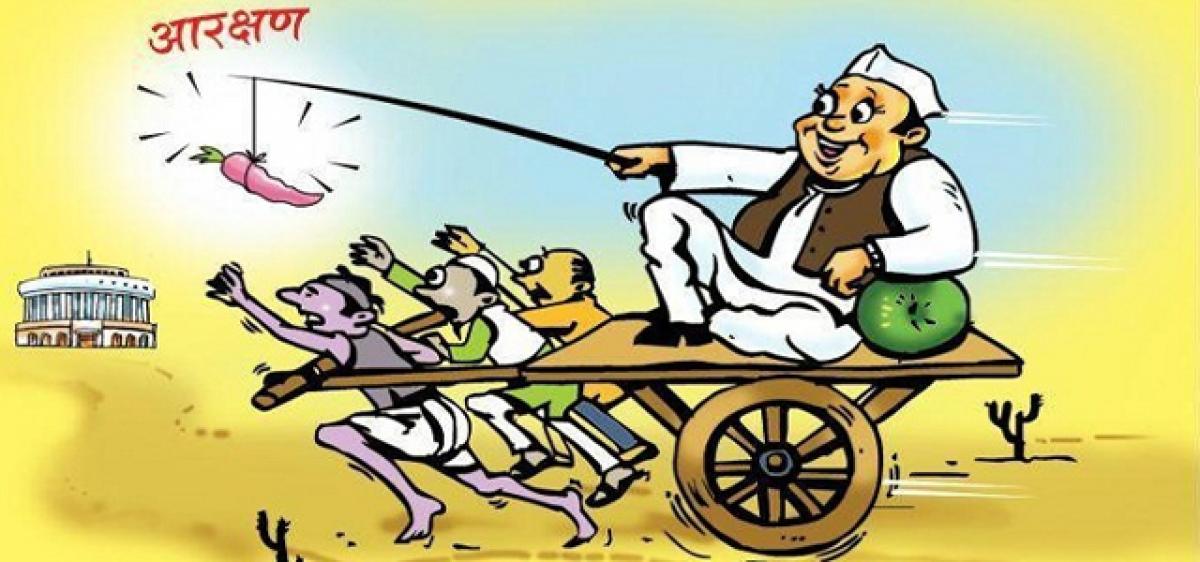Live
- Delhi BJP claims AAP govt will never pay women allowance like in Punjab
- India is 'Mother of Democracy': PM Modi
- ‘One nation, one election’ will undermine India’s federal structure: Mehbooba Mufti
- ‘Bachhala Malli’ trailer heightens anticipation
- Karnataka quota row: Backward Class forum chief warns Lingayat seer over 'tinkering with reservations'
- Tight security arrangements at Group-II examination centers District SP
- Alia Bhatt captures attention in white
- Varun Dhawan talks about ‘Baby John’
- ‘Moonwalk’ trailer promises a quirky heist, love, and loyalty
- Combat leaf spot disease
Just In

After 70 years of independence, there is still no change in the mindset of the national political party which was in power then and now in opposition, regarding the welfare of the Backward Classes community of this country, and this non-committal attitude is not going unnoticed by the BC populace of this country.
After 70 years of independence, there is still no change in the mindset of the national political party which was in power then and now in opposition, regarding the welfare of the Backward Classes community of this country, and this non-committal attitude is not going unnoticed by the BC populace of this country.
Efforts of the Father of Indian Constitution, Dr B R Ambedkar, for the development of OBC Community stalled abruptly. On September 27th, 1951 as the then First Union Cabinet Minister for Law in his resignation speech said, “I will now refer to another matter that had made me dissatisfied with the Government. It relates to the treatment accorded to the Backward Classes and the Scheduled Castes.
I was very sorry that the Constitution did not embody any safeguards for the Backward Classes. It was left to be done by the Executive Government on the basis of the recommendations of a Commission to be appointed by the President. More than a year has elapsed since we passed the Constitution. But the Government has not even thought of appointing the Commission.”
Dr BR Ambedkar expressed his anguish that how much ever he tried he couldn’t provide the constitutional rights to the BC community. He regretted that even after a year of the Constitution coming into force from 26th January of 1950 still, the government had not mooted any development schemes for the BC community in education. social and employment sectors.
He clearly expressed his dismay over the fact that the government under Nehru did not even appoint a BC Commission under the Article 340 of the Constitution and he being the Minister of Law couldn’t do much about it.
Post-Dr B R Ambedkar’s resignation and due to political and social pressures, the first BC Commission (Kaka Kalelkar Commission) was constituted in 1953. This first commission submitted its report in 1955, but due to the lack of unanimity in its recommendations, within the commission itself, the Nehru administration sidelined the report.
Later after 26 years, in 1979 Second BC Commission was constituted (BP Mandal Commission) during the reign of Morarji Desai's Janata Party Regime. Mandal Commission submitted its report to the then President of India Giani Zail Singh, on December 31, 1979. But the then government in power headed by Indira Gandhi binned the report.
After 10 years, in 1990 and under the leadership of VP Singh’s Janata Dal, the government, based on Mandal Commission Report, provided for 27 per cent reservations to the OBCs in the central government jobs. Later in 2006, the UPA-I government, following the special interest of the then HRD Minister Arjun Singh, introduced 27% reservations to OBCs in the central government educational institutions.
Due to lack of a separate ministry for OBCs and backlog post system, reservations could not be implemented at grassroots levels. After 24 years of reservations for OBC’s in place, only 7-11% were hardly implemented.
With an aim to provide Constitutional Rights to the National Backward Classes Commission (NCBC), a Constitutional Amendment Bill 123 will be introduced again in the current winter session of the Parliament which is a good development. The bill was introduced in the Lok Sabha and passed by the Modi government. The main opposition party which opposed this bill vehemently could not do much due to lack of a majority on its side.
Before this bill was introduced in Rajya Sabha, the government constituted Rajya Sabha select committee and the bill was referred to the select committee. Except for the main opposition party, all parties gave full support to the bill.
One should observe a serious note in this episode, if the governments want to commit honestly and whole heartedly to do good to the poor and underprivileged classes, then there is no need to politicise which has been shown by the commitment of Telangana Chief Minister KCR. Today, the whole national populace can see this development and forward-thinking approach in Telangana.
Keeping aside the political agendas, political differences, political philosophies, any suggestions and recommendation for the BC community welfare are whole heartedly accepted and implemented by this Telangana government and the CM KCR and he stands as an idol for BC welfare working tirelessly and whole heartedly for the same. (Writer is a Member of Telangana State Commission for Backward Classes)
By Dr V Krishnamohan Rao

© 2024 Hyderabad Media House Limited/The Hans India. All rights reserved. Powered by hocalwire.com







